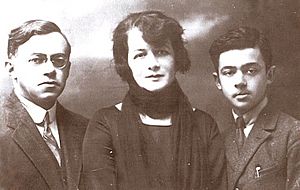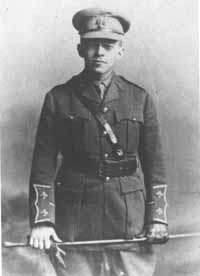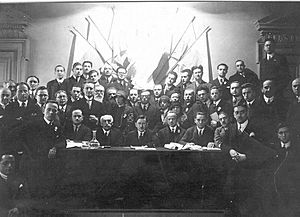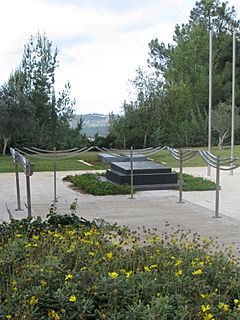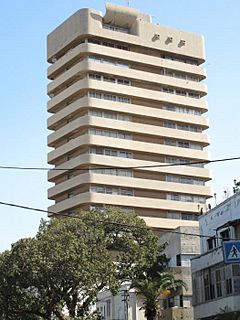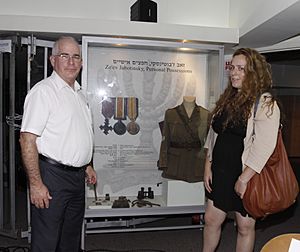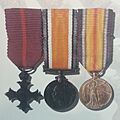Ze'ev Jabotinsky facts for kids
Quick facts for kids
Ze'ev Jabotinsky
|
|
|---|---|
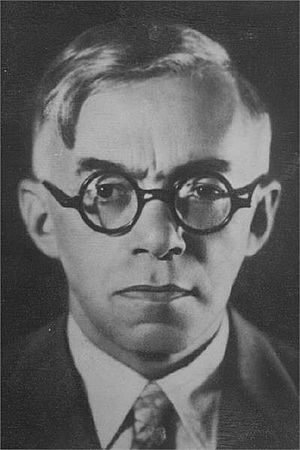
Jabotinsky in 1935
|
|
| Born |
Vladimir Yevgenyevich Zhabotinsky
17 October 1880 |
| Died | 3 August 1940 (aged 59) |
| Resting place | |
| Citizenship | Russian Empire |
| Alma mater | Sapienza University |
| Occupation |
|
| Years active | 1898–1940 |
| Known for | Betar movement; Jewish right-wing secular politics |
| Political party | Hatzohar |
| Spouse(s) |
Hanna Markovna Halpern
(m. 1907–1940) |
| Children | Eri Jabotinsky |
| Awards | Member of the Order of the British Empire (1919) |
| Military career | |
| Allegiance | |
| Service/ |
• Territorial Army |
| Years of service | 1915–1919 |
| Rank | |
| Unit | 20th Battalion, London Regiment Jewish Legion |
| Battles/wars | World War I |
Ze'ev Jabotinsky, born Vladimir Yevgenyevich Zhabotinsky (October 17, 1880 – August 3, 1940), was an important Jewish leader. He was a writer, poet, speaker, and soldier. He is known for founding the Jewish Self-Defense Organization in Odessa.
With Joseph Trumpeldor, he helped create the Jewish Legion in the British army during World War I. Later, he started several Jewish groups in Palestine, like Betar, Hatzohar, and the Irgun. His ideas greatly influenced Israeli politics, especially through leaders like Menachem Begin and Benjamin Netanyahu.
Contents
- Ze'ev Jabotinsky's Early Life
- Becoming a Zionist Leader
- Military Service in World War I
- Jewish Self-Defense in Palestine
- Starting the Revisionist Movement
- Literary Works
- Return to Palestine Blocked
- Plans for Jewish Evacuation
- Plan for a Revolt
- Vision for an Integrated State
- Death and Burial
- Legacy and Honors
- Published Works
- Images for kids
- See also
Ze'ev Jabotinsky's Early Life
Vladimir Yevgenyevich Zhabotinsky was born in Odessa, which is now in Ukraine. His family was Jewish but did not strictly follow Jewish traditions. His father, Yevno Zhabotinsky, was a wheat trader. His mother, Chava Zach, was from Berdychiv.
Vladimir's older brother died when he was a baby, and his father passed away when Vladimir was six. His sister, Tereza, later started a private school for girls in Odessa. In 1885, his family moved to Germany for a year because his father was ill.
Education and Early Career
Jabotinsky went to Russian schools. He learned Hebrew as a child, but he later wrote that his upbringing was not very connected to Jewish faith. His mother owned a stationery store in Odessa.
At 17, Jabotinsky left school to work as a reporter for a local newspaper, the Odesskiy Listok. He was sent to Bern and Rome as a correspondent. He also worked for another newspaper, Odesskie Novosti, after returning from Italy. He was a childhood friend of the famous Russian writer Korney Chukovsky.
Jabotinsky studied law at the Sapienza University of Rome but did not finish his degree. He spoke Russian, Yiddish, Hebrew, and Italian very well. In 1902, he was briefly held in prison in Odessa for his writings.
He married Joanna Galperina in October 1907. They had one son, Eri Jabotinsky, who later became involved in Jewish defense groups. Eri Jabotinsky served in Israel's first parliament, the Knesset.
Becoming a Zionist Leader
Before a terrible event called the Kishinev pogrom in 1903, Jabotinsky joined the Zionist movement. Zionism is the movement to create and support a Jewish homeland in Palestine. He quickly became known as a powerful speaker and a strong leader.
As more attacks on Jewish communities seemed likely, he created the Jewish Self-Defense Organization. This group aimed to protect Jewish people across Russia. His actions caused a lot of discussion within the Russian Jewish community.
Fighting for Jewish Rights
Around this time, he started learning modern Hebrew and chose a Hebrew name: Vladimir became Ze'ev, which means "wolf." During the attacks, he organized self-defense groups in Jewish communities. He also fought for the civil rights of Jewish people.
His famous saying was, "Better to have a gun and not need it than to need it and not have it!" Another slogan he used was, "Jewish youth, learn to shoot!"
In 1903, he was chosen to represent Russia at the Sixth Zionist Congress in Switzerland. After Theodor Herzl died in 1904, Jabotinsky became a leader of the right-wing Zionists. He moved to Saint Petersburg and helped edit a Russian-language magazine called Yevreiskaya Zhyzn (Jewish Life).
In 1905, he helped start the "Union for Rights Equality of Jewish People in Russia." The next year, he spoke at a major Zionist conference in Helsinki, Finland. He urged Jews in Europe to work together to demand equal rights for ethnic groups in Russia.
Jabotinsky believed that all ethnic groups should have equal rights. He said that in a future Jewish state, "Each one of the ethnic communities will be recognized as autonomous and equal in the eyes of the law."
Military Service in World War I
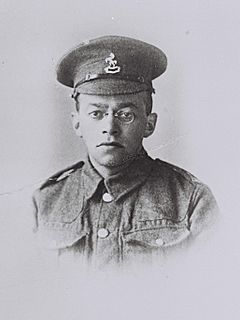
During World War I, Jabotinsky had an important idea: to create a Jewish Legion. This group would fight with the British against the Ottoman Empire, which controlled Palestine at the time. In 1915, he and Joseph Trumpeldor formed the Zion Mule Corps.
This unit had hundreds of Jewish men, mostly Russians who had been forced to leave Palestine by the Ottomans. The Zion Mule Corps fought bravely in the Gallipoli Campaign. After the corps was disbanded, Jabotinsky went to London. He continued to work hard to create Jewish military units to fight in Palestine as part of the British Army.
Joining the Jewish Legion
In 1917, the British government agreed to form three Jewish battalions, which became known as the Jewish Legion. Jabotinsky served as an honorary lieutenant in the 38th Royal Fusiliers. He fought in Palestine in 1918, and his battalion was one of the first to enter Transjordan.
He left the army in September 1919. He had complained to Field Marshal Allenby about how the British Army treated Zionism and the Jewish Legion. Even though his efforts to change the army's decision failed, he was awarded the Order of the British Empire (MBE) in December 1919 for his service.
Jewish Self-Defense in Palestine
After leaving the British Army, Ze'ev Jabotinsky openly trained Jews in how to fight and use small weapons. On April 6, 1920, during the 1920 Palestine riots, British authorities searched Zionist offices and homes for weapons. They found some weapons in a building used by Jabotinsky's defense groups.
Nineteen men were arrested. The next day, Jabotinsky told the police that he was their leader and responsible. He asked for them to be released, but instead, he was arrested too. The nineteen men were sentenced to three years in prison, and Jabotinsky received a 15-year prison term for having weapons. However, they were all pardoned a few months later.
Starting the Revisionist Movement
In 1920, Jabotinsky was chosen for the first Assembly of Representatives in Palestine. The next year, he was elected to the executive council of the World Zionist Organization. He also helped start Keren Hayesod, a fundraising organization, and worked as its propaganda director.
In 1923, Jabotinsky left the main Zionist movement because he disagreed with its chairman, Chaim Weizmann. He then started a new party called Alliance of Revisionists-Zionists. He also founded its youth movement, Betar, which was named after Joseph Trumpeldor.
Goals of the Revisionist Movement
His new party wanted the main Zionist movement to clearly state its goal: to create a Jewish state on both sides of the Jordan River. Jabotinsky's main aim was to build a modern Jewish state with help from the British Empire.
His ideas were different from the socialist-leaning Labor Zionists. He focused on supporting the Jewish middle class in Europe. He imagined a Jewish state that was like the British Empire's model. Most of his supporters were in Poland, and he worked to get British help for the Jewish settlement in Palestine.
Jabotinsky was both a nationalist and a liberal democrat. This means he believed in a strong Jewish nation but also in individual freedom. He famously said, "Every man is a king." He supported a free press and believed the new Jewish state would protect the rights of minorities.
He also believed in a free market with little government control. However, he felt the state should provide basic needs like food, housing, clothing, education, and medical care for everyone.
Literary Works
In 1898, Jabotinsky worked as a correspondent in Rome for Odessky Listok, writing under the pen name "V. Egal." Later, he used the name Altalena, which he thought meant "elevator" but actually meant "swing." He explained that "swing" suited him because he was "by no means stable or constant."
In 1914, Jabotinsky translated Edgar Allan Poe's famous poems The Raven and Annabel Lee into Hebrew for the first time.
From 1923, he edited the Jewish weekly Rassvet (Dawn), published in Berlin and then Paris. Besides his journalism, he wrote novels. His historical novel Samson Nazorei (Samson the Nazirite, 1927) is set in Biblical times. It shows Jabotinsky's idea of an active, brave Jewish life.
His novel Pyatero (The Five, 1936) is about Jewish life in early 20th-century Odessa. It has beautiful descriptions of the city and its people. Although it wasn't well-known at first, it has gained new appreciation in recent years.
Return to Palestine Blocked
In 1930, while Jabotinsky was visiting South Africa, the British Colonial Office told him he would not be allowed to return to Palestine.
Plans for Jewish Evacuation
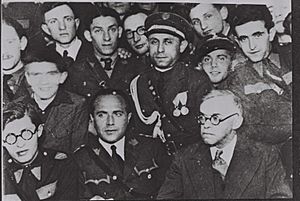
In the 1930s, Jabotinsky was very worried about the Jewish community in Eastern Europe. In 1936, he created an "evacuation plan." This plan called for 1.5 million Jews from Poland, the Baltic States, Germany, Hungary, and Romania to move to Palestine over ten years.
He proposed this plan on September 8, 1936. The plan suggested that 75,000 Jews from Poland, aged 20–39, would leave each year. Jabotinsky's goal was to reduce the Jewish population in these countries so that anti-Jewish feelings would lessen.
He traveled through Eastern Europe, meeting with leaders like the Polish Foreign Minister, Colonel Józef Beck. He discussed the evacuation plan with the Regent of Hungary, Admiral Miklós Horthy, and the Prime Minister of Romania, Gheorghe Tătărescu. All three governments approved the plan.
However, the plan caused a lot of debate among Polish Jews. Many felt it played into the hands of those who disliked Jews. The British government also rejected the plan, and the chairman of the World Zionist Organization, Chaim Weizmann, dismissed it.
In 1938, Jabotinsky warned that Polish Jews were "living on the edge of the volcano." He said, "Catastrophe is approaching. ... I see a terrible picture ... the volcano that will soon spew out its flames of extermination." He urged Jews in Europe to move to Palestine as soon as possible.
Plan for a Revolt
In 1939, Britain issued the MacDonald White Paper. This document limited Jewish immigration to Palestine to 75,000 people over five years. After that, more immigration would need Arab approval. It also restricted land sales to Jews.
Jabotinsky responded by suggesting a plan for an armed Jewish revolt in Palestine. He sent his plan to the Irgun High Command in secret letters. He proposed that he and other "illegals" would arrive by boat in Tel Aviv in October 1939.
The Irgun would help them land safely and escape. They would then take control of key British buildings in Palestine, like Government House in Jerusalem. They would raise the Jewish national flag and hold off the British for at least 24 hours. Zionist leaders in Europe and the United States would then declare an independent Jewish state.
Irgun commanders were impressed but worried about the high number of casualties. Avraham Stern suggested bringing 40,000 armed young immigrants to help. The Polish government supported the plan and began training Irgun members and providing weapons. However, the start of World War II in September 1939 stopped these plans.
Vision for an Integrated State
Jabotinsky believed that Arabs and Jews could live together with equal rights in a Jewish state. He wrote, "We do not want to eject even one Arab from either the left or the right bank of the Jordan River. We want them to prosper both economically and culturally."
He imagined a Jewish Palestine where most people would be Jewish, but all Arab citizens would have equal rights. He knew that Jews would face opposition from Arabs when trying to regain parts of Palestine.
In 1934, he wrote a draft constitution for the Jewish state. It stated that Arabs would have equal standing with Jews in all parts of public life. Both communities would share duties in the military and civil service and enjoy the same benefits. Jabotinsky suggested that Hebrew and Arabic should be equally important languages. He also proposed that if the prime minister was Jewish, the vice-prime minister should be Arab, and vice versa.
Death and Burial
On May 12, 1940, Jabotinsky offered Winston Churchill the support of a Jewish Army to fight the Nazis. He also suggested creating a united front with Chaim Weizmann and David Ben-Gurion.
While visiting New York to gather support for a Jewish Army, Jabotinsky died of a heart attack on August 3, 1940. He was at a Jewish self-defense camp run by Betar in Hunter, New York. He was buried in New Montefiore Cemetery in Farmingdale, New York, as he wished.
In 1964, his remains and those of his wife were reburied in Mount Herzl Cemetery in Jerusalem. This was done by order of Israeli Prime Minister Levi Eshkol, following another part of Jabotinsky's will.
Legacy and Honors
Ze'ev Jabotinsky's ideas were continued by Israel's Herut party. This party later joined with other right-wing groups to form the Likud Party in 1973. Likud has been a major right-wing party in Israel and has been part of most Israeli governments since 1977.
His legacy is also honored by groups like Herut – The National Movement, Magshimey Herut, and Betar. In the United States, his call for Jewish self-defense led to the creation of Americans for a Safe Israel and the Jewish Defense Organization. The JDO's training camp is called Camp Jabotinsky.
- In Israel, 57 streets, parks, and squares are named after Jabotinsky. This is more than for any other person in Jewish or Israeli history.
- The Jabotinsky Medal is given for great achievements in literature and research.
- The Jabotinsky Institute in Tel Aviv keeps documents and research about the history of Betar, the Revisionist movement, the Irgun, and Herut.
- A bronze statue of Jabotinsky by Johan Oldert was placed at the Metzudat Ze'ev in Tel Aviv in 2008.
- Jabotinsky Day (Hebrew: יום ז'בוטינסקי) is an Israeli national holiday. It is celebrated every year on the 29th of the Hebrew month of Tammuz. It honors the life and vision of Ze'ev Jabotinsky.
- In the 1990s, a church in Sweden called Livets ord started an organization called Operation Jabotinsky. Its goal was to help Jewish people, especially from the former Soviet Union, move to Israel.
Published Works
- Turkey and the War, London, T.F. Unwin, Ltd. [1917]
- Samson the Nazarite, London, M. Secker, [1930]
- The Jewish War Front, London, T.F. Unwin, Ltd. [1940]
- The War and The Jew, New York, The Dial Press [c1942]
- The Story of the Jewish Legion, New York, B. Ackerman, Inc. [c1945]
- A Pocket Edition of Several Stories, Mostly Reactionary, Tel-Aviv: Reproduced by Jabotinsky Institute in Israel, [1984]. Reprint. Originally published: Paris, [1925]
- The Five, A Novel of Jewish Life in Turn-of-the-Century Odessa, Paris, [1936]
- Jabotinsky translated Edgar Allan Poe's "The Raven" into Hebrew and Russian. He also translated parts of Dante's Divine Comedy into modern Hebrew poetry.
- "The East Bank of the Jordan" (also known as "Two Banks has the Jordan") is a poem by Jabotinsky. It became a famous slogan and song for Betar.
- Vladimir Jabotinsky's Story of My Life, Brian Horowitz & Leonid Katsis, eds., Detroit: Wayne State University Press, 2015.
Images for kids
-
Miniatures of the MBE, British War Medal and Victory Medal awarded to Jabotinsky.
See also
 In Spanish: Zeev Jabotinsky para niños
In Spanish: Zeev Jabotinsky para niños
 | James Van Der Zee |
 | Alma Thomas |
 | Ellis Wilson |
 | Margaret Taylor-Burroughs |


